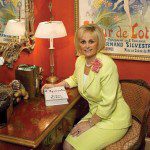Kitty Kelley
By • May 23, 2011 0 3921

There’s a temptation on my part, sitting in Kitty Kelley’s sun-drenched Georgetown office, to say “We’ve got to stop meeting like this.”
?About every half decade or so, we sit down to chat in the stormy aftermath of the publication of one of her books in which she has taken on the mighty, the powerful, the awesomely famous, rich, and legendary, and rendered them very human in her inimitable way, which delights hordes of readers and infuriates not only the subject of her books, but any number of apologists and high-minded critics.
?Inevitably, I ask yet again: So, what’s next? Kelley swears and vows, probably with her fingers a little crossed behind her back, that she’ll never write an expose again, or put herself through the eye of what is a self-created storm.
?This time that storm is “Oprah,” the mega-bucks talk show host, friend to presidents, the nation’s literary guide, magazine publisher and, in some mass-communication way, probably the most influential African-American woman in the world. In other words, another unauthorized biography full of controversial, highly inflammatory and often negative information about a woman who’s mostly revered, adored and admired by millions.
?“I don’t know why I keep doing this,” she says again. “This one was especially difficult to do, maybe the most difficult … maybe you noticed: no CNN, no Larry King, no Walters, not much television. There’s a reason. Everybody is very loyal in this business, and with Oprah, also afraid. They pretty much told me as much.”
?Kelley, a small, stylish, blonde woman who can trade barbs, stories and humor easily, has charm that’s undeniably genuine. But while there are lots of cat figures in the living room of the office, and while there have been cat-and-catty jabs at her from some less-than-kind critics, there’s no question that she can defend herself when necessary. Even a suggestion that some material in her books might be off target draws a heated defense of her work. “I’m a biographer,” she says. “I write unauthorized biographies. It’s not a term I entirely like because the reputation of the word makes it sound like it’s merely sensational. And that’s not true. I’ve never been forced to make a retraction about anything in any of my books. I’m a trained researcher, that’s what I did when I worked in newspapers.”
?Inevitably, she shows me the room containing the nearly 3000 files of interviews, references and material that accumulated during the course of putting the book together. Similar volumes of raw material emerged in writing her previous books.
?“It’s like living in somebody else’s life for, what, five years now,” she says. “And Oprah is endlessly fascinating. I admire her, she’s accomplished so much. But, for one thing, she didn’t come from the dire poverty she’s always talked about. And that’s just one thing.”
?There are stories that emerge in the book that, if they’ve existed at all, came from out there in the dimmest reaches of rumor land, including the assertion that the man she’s always claimed as her father isn’t really her father, and that she had a child out of wedlock as a teenager.
?Part of the problem with a subject like Oprah, and for that matter, Jackie Kennedy, Elizabeth Taylor, Nancy Reagan, Frank Sinatra, the royal family and the Bush family, is that so much is out there already. Kelley’s subjects are the supernovas around which a planetary system of scribes, sycophants, biographers, paparazzi, gophers, family members, and history itself rotates. With Oprah, this is also true, only much more so. She is her own supernova. In her daily talk shows, she has talked so much about herself, her problems and triumphs, her family, her struggles and dissatisfactions with her weight and looks, that it seems her life is an open, tearful and triumphant book of its own.
?Who, then, needs a Kitty Kelley book about Oprah? Well, we do.
?“She’s done enormous good in the world, and I think she’s an influence for good,” Kelley says. “But she’s also hidden a lot of her life, she has a darker side. She’s not a saint.”
?“Oprah” is a terrific read, much in the same way that all of Kelley’s other books work. They have a monumental speed to them, they rush and throw accumulations of detail that in the end give you a big picture. The “tell” stories aren’t as important as they appear at the book’s arrival — it’s the overall weight of material, painstakingly accumulated and acquired, that is telling. In this case, they round out the story, like a very big Paul Harvey “rest of the story.”
?In the long run, all her books are about fame, they’re very American in their focus, even the book about the royal family, which of course included a hefty section on Princess Diana. They’re about fame and its flipside, infamy, about the importance of success and celebrity in American life. One of the telling things about all the books, whether they concern royal Brits, American singing legends, political dynasties, movies stars or billionaire talk show hosts, is how they bring out an essential homegrown vulgarity that seems to be as natural a by-product of fame as breathing itself.
?And every book is a pain, a project fraught with dangers and difficulties. In these efforts, she has a dogged, persistent quality that can only be called courage.
?“None of the people I wrote about ever submitted to interviews,” Kelley says. “Not that I wouldn’t have loved to talk to Oprah, but she, like everybody, gave no interviews.”
?“It was hard to get some interviews,” she says. “You’d be surprised how afraid people are. She has a powerful bully pulpit in that show, she knows so many people. But in some ways, she was my best source, from the shows and the magazine.”
?Sinatra apparently was not amused to be made into a Kelley title, a book that for many people made it less fun to listen to a song like “I Did It My Way.” The Bush family closed ranks, and mounted a negative attack campaign prior to its publication, which just happened to be near election time in 2004. Matt Lauer put Kelley through a grinder in two interviews on the Today Show, which she handled deftly.
?She’s one of those people who’s proud of some of the enemies she’s acquired — they’re a kind of validation of the work. No amount of attacks, criticism, charges of sloppiness or inaccuracy deter Kelley or her readers. “We’re debuting number one on the New York Times bestseller list,” she says, indicating that being number one makes for a good Sunday morning.
?She and her husband, Dr. Jonathan Zucker, still live in Georgetown, where she just held a book signing at St. John’s Episcopal Church on O Street, the proceeds of which went to charity.
?“It’s my home,” she says. “I love Peacock Café, I like the gym at GU, the streets, the old homes, the shops, the people. What’s not to love?”
?Listening to her talk about her work, over the years, is to recognize that while she may complain about the mountainous work involved, she’s also driven by keen curiosity, and a pride of profession. She doesn’t much rely on decorative style or literary allusion, just stories, anecdotes, dug-up facts, cross-references. Gossip and rumors, the daily diet bread of our lives, are the spice in that mountain of stuff, not its essence.
?She has no plans for her next book, and says she won’t do another. We’ve heard that one before.
Signed copies of Oprah’s book are available at Proper Topper (Georgetown, 3213 P St., Dupont Circle, 1350 Connecticut Ave. and online at www.propertopper.com). All proceeds will go to the D.C. Public Library for the Peabody Collection — and matching funds from a generous donor.
- Kitty Kelley’s recent expose of Oprah Winfrey has sparked controversy and backlash. | Tom Wolff




